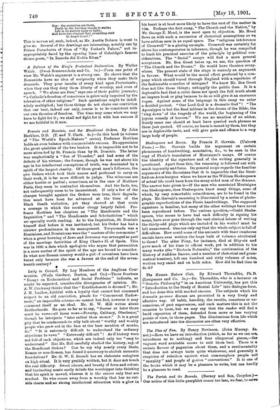Laity in Counct By Lay Members of the Anglican Com-
munion. (Wells Gardner, Darton, and Co.)—These fourteen "Essays on Ecclesiastical and Social Problems" indicate, as might be expected, considerable divergencies of opinion. Mr. A. W. Crick may thinks that the" Establishment is doomed "; Mr. J. M. Ludlow, faithful with a loyalty that cannot but command respect to an old conviction, pleads for "Concurrent Endow- ment," an impossible scheme one cannot but feel, however it may commend itself as an ideal. Mr. H. W. Hill writes about Brotherhoods. He goes so far as to say, "Sooner or later there must be vows—all three vows—Poverty, Celibacy, Obedience," though he interjects "later rather than sooner." It is a great pity that he condescends to silly talk about "worthy and weakly people who grew red in the face at the bare mention of monks, &c." "it is extremely difficult to understand the ordinary objections to vows" "Extremely difficult "! As if history were not full of such objections, which are indeed only too "easy to understand." Has Mr. Hill carefully studied the history, say, of the Mendicant Orders ? Can he say why nearly every State, Roman or non-Roman, has found it necessary to abolish monastic foundations ? Mr. G. W. E. Russell has an elaborate etdogium on high ritual. It is very prettily written, but it does not touch the real difficulty. Sweet odours, and beauty of form and colour, and fascinating music easily delude the worshipper into thinking that his spirit is moved, whereas it is the senses only that are reached. He who comes away from a worship that has no out- side charm and no strong intellectual attraction with a glow in his heart is at least more likely to have the root of the matter in him. Perhaps the first essay, "The Church and the Nation," by Mr. George E. Mead, is the most open to objection. Mr. Mead flows on with such a succession of rhetorical assumptions as we have seldom seen in an equal space. The "religious intolerance of Cromwell" is a glaring example. Cromwell was certainly far above his contemporaries in tolerance, though he was compelled to limit his practical exercise of the principle by political con- siderations. The "Social" essays will find a more general acceptance. Mr. Ben Greet takes up, we see, the question of "The Church and the Drama." He would have theatres every- where. The present state of the stage is scarcely an argument in favour. What would be the moral effect produced by a com- pany which should travel through England with a repertoire of the fashionable comedies of intrigue ? We know Mr. Ben Greet does not like these things; unhappily the public does. It is a deplorable fact that a critic dares not speak the full truth about an impure book or play because to do so will give it an enormous vogue. Against some of the language in this essay we enter a decided protest. "Our Lord God is a dramatic God" I "The Apocalypse is but the final tableau in the drama of the Bible, the 'ring down' of the tragedy of the world, the beginning of the joyous comedy of heaven." We see no mention of an editor. Surely some one should at least have queried such phrases as those just quoted. Of course, no harm is meant by them, but they are in deplorable taste, and will give pain and offence to a very large body of people.






































 Previous page
Previous page